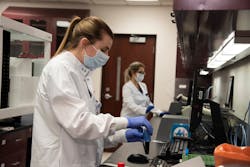“We recognized that there would be a need for this testing,” explained Gabriel Maine, PhD, Technical Director of Immunology in the Special Chemistry section of the Department of Pathology and Laboratory Medicine at Beaumont Hospital, Royal Oak, MI. He also is an Associate Professor at Oakland University William Beaumont School of Medicine.
The eight-hospital Beaumont Health, based in Southfield, MI, offered serology testing initially to its 38,000 employees and select hospital patients, beginning in mid-April, but it plans to expand the service to other patient groups.
With widespread serology testing, which detects the antibodies the body produces to fight off viruses such as SARS-CoV-2, not only Michigan but also the country would be able to determine how many people have developed antibodies. The antibodies are immunoglobulin M (IgM), which appears in a patient’s blood early in an infection, immunoglobulin G (IgG), which IgG appears later during an infection.
Designing a research study
That is why the Beaumont Research Institute, also part of the health system, is conducting a research study, which has been approved by an institutional review board (IRB). Researchers plan to use de-identified testing data from employees to answer such questions as:
- How susceptible are healthcare workers to a COVID-19 infection?
- Does a person’s antibody response increase or decrease over time?
- What is the relationship between antibody levels to symptoms or severity of COVID-19?
- Do the antibodies protect people from reinfection?
Private philanthropic donors contributed $3 million to fund the research study.
Based on the level of interest in the study among Beaumont’s employees, who want to know about their individual antibody status, Maine believes the study is likely to be one of the largest in the United States.
Indeed, the National Institutes of Health (NIH) in April announced that it also has launched a similar serological study, but it is planning on recruiting only 10,000 volunteers.
Rolling out the test
In Beaumont Health’s case, the rollout of serology testing began with a commitment from the health system’s C-suite. Hans Keil, Senior Vice President and Chief Information Officer, has been involved in the project from the get-go, providing access to funding as well as guidance on administrative matters.
The first step in the process was the purchase of two EUROLab Workstations, which the health system installed in two empty rooms in the lab department. Beaumont also secured a commitment from the vendor, PerkinElmer’s EUROIMMUN, to supply at least enough of the Anti-SARS-CoV-2 ELISA testing kits to complete the research study.
Maine expects all participants in the research study to be tested twice for the antibodies; however, employees at high risk for exposure to the virus may be tested on more than two occasions.
Once the analyzers arrived in March, EUROIMMUN’s field staff spent three days onsite installing them and training Beaumont Health’s lab staff on how to operate them. A half dozen employees from the day shift were trained initially. But Maine said Beaumont wants to expand testing capacity, so the lab will likely teach some employees on another shift to operate the analyzers.
To speed up the rollout process, many elements of the project were conducted in parallel, Maine noted. For example, the staff from the laboratory information system (LIS) group created an interface to move the test data from the analyzers to the LIS, while Maine and his team spent three weeks validating the test.
To support the research end of the project, staff members from the health system’s information systems department and research institute helped create an electronic questionnaire and consent form that both launch from within email invites sent to employees. The IT staff also created a designated place in the electronic medical record to post test results.
Meanwhile, the project team developed a plan for a phased rollout of the service to employees, starting with the hospital in Royal Oak and expanding gradually to the other hospitals.
The lab offered serology testing to employees in successive groups, based on their risk of exposure to the novel coronavirus. “The reason was to control the workflow at the collection sites,” Maine said. “We did not want to have a situation where a huge number of employees would show up.”
Tweaking the process
Before launching serology testing at Royal Oak, the team held a one-day pilot test. The interest among employees was very high, and some of them signed up for the test even though they had not yet received an email inviting them to participate.
“We had to create an invite with a code, and the code would get you into the system to sign up,” he said, explaining how the team addressed the issue.
Overall, the project has gone well. “Since going live, we haven’t had any issues that weren’t readily manageable or remedied. All of the issues were relatively small in the grand scheme of things,” Maine said.
When asked what the key to success was, Maine said, “We have had the right people pulled into the project.” This included both clinical and technical lab employees, pathologists, immunologists, epidemiologists, researchers and IT staff, among others.
Expanding capacity
The health system is expanding serology testing to a second platform: Abbott’s SARS-CoV-2 IgG test, which Beaumont selected because it already has the analyzers to run the test.
Before Beaumont expands serology testing to patients broadly, however, the system first needs to develop criteria for testing. “We want to make appropriate test utilization a high priority,” Maine said.


